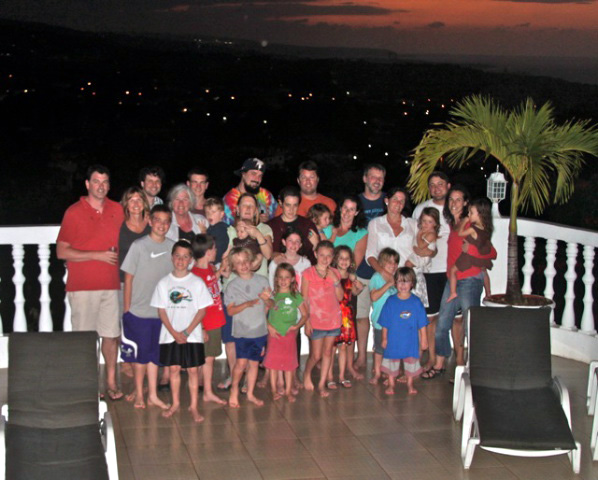TW Column by Steven Lewis
Lessons From a Family Vacation in Jamaica
Everyone—and I mean everyone—had warned us (closed eyes, tight shakes of the head) that Jamaica is both deplorably impoverished and (open eyelids, raised brows) terrifyingly dangerous.

Wink.
And so everyone—and I do mean everyone—advised us to stay in one of those lovely and safe, perfectly manicured, all-inclusive resorts between Montego Bay and Ocho Rios, each one resembling an exclusive mental institution, complete with walls, gates, well-tended tropical gardens, and black medical aides posing as uniformed staff members who deliver daily doses of Benzodiazepines in the form of umbrella drinks, fusion cuisine, chaise lounges, snorkeling instructors, and glass-bottom boats.
Nevertheless, the thirty of us—meaning my everyone: my mate Patti, our seven grown children, their five spouses, and our sixteen grandchildren—disregarded the hand-wringing naysayers back home and opted to stay up in the hills on the north coast of Jamaica around Runaway Bay, an apt name and locale for anyone yearning to escape the trappings of civilization. We rented a villa with the suspect name of Valley High, which accommodated 21—the four families with babies—while the other 9 arranged to stay at a small hotel down the steep jungle-y hill.
Runaway Bay, rich and poor, night and day, is stunning to the senses, all the senses: complicated, messy, elegant, transcendent, and feral. Like nature. Like children. Was there poverty? Oh, yeah. Crime? Yup. But it should be noted that there was something of a different nature in the Jamaican poverty and crime we experienced, something altogether unlike the gut-wrenching deprivation, the soulless transgression I’ve known in the mean streets around Newburgh, New York, or Dorchester, Massachusetts.
 Even behind the walls of the rusting tin shacks that sat near the beach or off the narrow road winding up the mountain to Nine Mile and Bob Marley’s mausoleum, yam plants and coffee beans growing up the hillsides, no one was starving, no one wore that hideous mask of simmering rage. Not the guy on the beach with a starfish on his head. Not the women on the beach who braided hair. Not the security guard with a machete in one hand, a big fat blunt in the other. Not the roaming dogs. Not the goats. Not the children.
Even behind the walls of the rusting tin shacks that sat near the beach or off the narrow road winding up the mountain to Nine Mile and Bob Marley’s mausoleum, yam plants and coffee beans growing up the hillsides, no one was starving, no one wore that hideous mask of simmering rage. Not the guy on the beach with a starfish on his head. Not the women on the beach who braided hair. Not the security guard with a machete in one hand, a big fat blunt in the other. Not the roaming dogs. Not the goats. Not the children.
As a man, a writer, a father well-schooled in the primitive vicissitudes of life by his seven kids, I have been rendered slack-jawed, time and again, by the illusions of supposedly sophisticated, educated people who are so cut off from their own nature that they have no idea of the wholly and holy dynamic nature of children’s lives. People who are so detached from their misunderstood “inner child” that they have lost all connection to the uncontained withness of nature.
Oh, if only they could have seen my tamed-untamed grandchildren at Runaway Bay: the infants sucking on breasts; toddlers clawing in the sand; an alpha monkey’s swipe from a four-year-old as he mindlessly reminds the two-year-old about the order of things…something he learned from the six-year-olds and they from the nine-year-olds.
If my detached comrades could have just heard the gleeful screams of a raft of bald-skinned otters dunking each other in the ocean, or looked inside the wailing mouth of a two-year-old Chestnut-bellied Cuckoo refused some candy, or joined the herd at the long dining room table at Valley High, where the unfettered talked too loud, chewed with their mouths open, picked up plantains with their paws, Jamaican jerk sauce on their chins…yes, then they would have come to understand Delmore Schwartz’s “heavy bear” and that “scrimmage of appetite everywhere.”
And oh oh oh, now to be back in the presence of two of my beautiful and refined thirty-something daughters, Addie and Clover, standing there on the beach with babies on their hips, bare feet wiggling in the sand, reverting before my squinting eyes to the feral girls they once were, laughing in delight at their (65-year-old) longhaired (and balding) father sitting on a white plastic chair right beside the stunningly gorgeous nine-year-old Bella, the two of us getting our hair braided and beaded.
Someone walking along the beach right then might have mistakenly concluded that the old goat in the chair was an escapee from a mental institution. Or an all-inclusive resort.
Not a pale Rasta mon right at home in this feral paradise.
Publications Info
- The title “In This Bright Future, You Can't Forget Your Past” is a line from the Bob Marley song "No Woman No Cry."
- “The Heavy Bear Who Goes With Me” by Delmore Schwartz.
Art Information
- “Bella in Jamaica,” “Starfish Guy,” and “The Family in Runaway Bay” © Steven Lewis; used by permission
 Steven Lewis is a contributing writer and columnist at Talking Writing. The photo at left shows the braided and beaded Steve in Jamaica.
Steven Lewis is a contributing writer and columnist at Talking Writing. The photo at left shows the braided and beaded Steve in Jamaica.
“With seven kids spanning a generation-wide 19 years, the logistics of any July–August escape from civilization proved to be as complicated and unrealistic as my preadolescent hallucinations about playing shortstop for the Brooklyn Dodgers.” — The Road We Never Traveled

